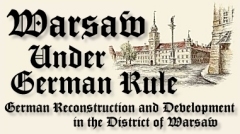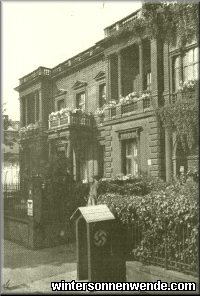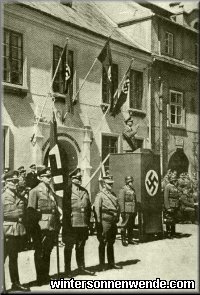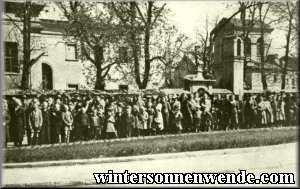 |
 The Work of the National Socialist Party It is the nature of the National Socialist state that the men of the Party follow in the immediate footsteps of the German soldiers and the administration in order to see to the material and ideological care of the German people. An account of German reconstruction and development in the District of Warsaw would thus be incomplete without a mention of the work of the National Socialist Party, which has been represented in the General Government from the start. Already in the first days of October 1939, the NSDAP carried out a large-scale relief action by deploying the NSV's* "Relief Unit Bavaria" to the starving city of Warsaw. Far more than 100,000 people a day were fed by this relief unit in those days. No political distinction was drawn between the ethnic Germans and the rest of the people; the only concern was to get the starving masses off the streets. Everyone who witnessed those mass food distributions knows the great benefits of that social care measure. Tens of thousands of women and children had crowded the city's great public squares and waited eagerly for their first hot meal in days. This measure, informed as it was by great social understanding, was the best possible first impression the Party could have chosen to make. In the period following, the ethnic Germans were provided with food on an ongoing basis in the "German Club". In other respects as well, the Party took up its political work immediately after the cease of hostilities; in particular, the men from the Division of Propaganda ensured that all measures to be taken were in accordance with overall Party policy. The organizational role of the Party, however, did not begin until May 6, 1940. That was when the Führer ordered the establishment of an NSDAP department responsible for the General Government, thus providing for the Party's establishment and development in the Vistula region. The actual organizational work of the Party in the General Government began with the NSDAP's first general membership roll call on August 15, 1940. A vast timespan lies between the first struggles of Germanic people for the Vistula region, and this concentration of NSDAP Party work. The Germans' battle for the Vistula region has been ongoing for millennia. Time and again, German settlers had travelled to the East in order to find new living space. But these German efforts at colonization were destroyed by the intrusion of Eastern peoples. Many Germans also intermixed with other ethnic groups and thus gradually became lost to the Germanic people. In the city of Warsaw, only 20,000 Germans were still found to be ethnically German in Russian times, and in 1931 the last Polish census even recorded only 3,000 Germans. The rural Germans who had settled in small ethnic communities survived much better. Even if the German language has frequently been lost, the peasants did remain German in their nature and their basic way of thinking. In smaller industrial centers as well, such as in Zyrardow, quite a considerable number of Germans acknowledged their ethnic affiliation right until the very end. In 1926 the German tradition in Poland gained new impetus through the establishment of the "German University Students' Association" in Posen and Litzmannstadt, and in 1930, following protracted discussions with the Polish Government Commissioner, the "German Club", considered an unpolitical association, was established in Warsaw. All nationals who professed themselves ethnically German could join this club. By means of its cultural and social events, the "German Club" managed to keep the few remaining Germans together. In 1933 a local chapter of the Polish Division, a foreign organization of the NSDAP, was set up in Warsaw and became the deciding factor in the further configuration of German life in Warsaw. In this context, the establishment of a local chapter of the Young German Party in Poland must also be mentioned; it was the first to bring the National Socialist Idea to the rural Germans and thus to effect the first-ever political organization of the rural populace. In the time that followed, political work was energetically promoted by the "Local Chapter of the German Ethnic Association". As of 1935, the "German Welfare Service of Posen" also expanded its sphere of activity to include the area of Warsaw. Through the efforts of this organization, increasing numbers of children were being sent to the Reich on subsidized holidays. Despite the Polish–German treaty of friendship, the cultural and economic pressures exerted by the Polish authorities and people grew ever greater.That the German schools were closed has already been mentioned in greater detail in a previous chapter. German newspapers as well were denied postal delivery, and were finally banned altogether. German meeting places were demolished by rioting Polish students, and German-speaking people were attacked. Members of the ethnic German minority living in Warsaw had a particularly hard time of it just prior to the outbreak of the war; severe and brutal measures were taken against them. Anyone who at that time openly acknowledged that he was German ended up in prison, or in the concentration camp Bereza Kartuszka where many died or had to endure unspeakable suffering. Only very few Germans managed to flee in time, or to find an adequate hiding place. As early as April 20, 1940 the Governor General had ordered the establishment of the "Ethnic German Community", which at first was an association under Party care but which was soon integrated into the Party. The Ethnic German Community was later dissolved, and
As part of the organizational framework of the Party, District Divisional Headquarters have been established in the individual districts of the General Government. The District Divisional Headquarters in Warsaw preside over 29 Divisions, which in turn are subdivided into 126 Cells and 481 Blocks. In Warsaw, the District Divisional Headquarters have immediately taken up comprehensive work for the Party. They devote especial attention to persons of German descent, of whom many have been away from their homeland for decades. A great deal has been done for these people in terms of social care. Under the direction of the District Divisional Headquarters,
have been established. The relief organization "Mother and Child" currently attends to some 4,500 families in the District of Warsaw. 652 infants have been cared for by the infant care organization, and 1,236 children as well as mothers with many children have been sent away for rest and convalescence. German wards have been set up in the hospitals of Skierniewice and Zyrardow, and staffed with nurses arranged for by the NSV. The care of the wounded was a very important aspect of this work, especially in the winter months of 1941–42. The Women's Service Unit provided 118 assistants to help out in the hospitals; rendering a total of 14,160 service hours, these women did much to ease the work of the professional nurses. Also, 394 ladies as well as members of the BDM serve as regular visitors to the hospitals. The tireless assistance of all women in the District has enabled the care of the wounded to be seen to most efficiently. At Easter 1942, as well as on the Führer's birthday, special treats were in store for the wounded; the women and children had mostly worked nights to finish the gifts. In the Mothers' Service Department, 3 instructors teaching 7 courses monthly have educated 140 participants in health, patient, and infant care in the home. These courses were held even in the most remote Divisions and Cells and under the most adverse conditions. The Department of War-Time Home Economics held 9 short courses with 86 participants. These courses provided education and helpful hints about war-economical housekeeping, nutrition, the preparation of fresh vegetables, economical sandwich spreads, etc. The most important work with respect to the care and organization of young people has been effected through the Hitler Youth Organization (HJ and BDM). In the District of Warsaw, 500 boys and 450 girls have been registered in the county precinct Warsaw (rural), 600 boys and 500 girls in the city precinct Warsaw, and 500 boys and 500 girls in the county precinct Lowitsch. Whereas membership in the Hitler Youth organization has been on a voluntary basis to date, the Youth Membership Decree, issued only recently, has expressly authorized the General Government's Hitler Youth to extend mandatory membership to all young people, as is the case in the Reich. In Warsaw the HJ has established a youth hostel where needy boys from small farming communities are provided with accommodations for the duration of their training as metalworkers. The very important Department of Labor and Social Policy began operations on May 16, 1942. Its first task was the organizational registration of all German businesses and authorities. To date, 300 German businesses have been recorded. A co-ordinating team responsible for the German job training system was set up on May 22, 1942. The representatives of this team are kept informed of the educational partnerships and apprenticeships which are required, so that they can advise the Germans in the relevant businesses with respect to the resources available. The Party has also promoted cultural education. Language courses free of charge were made available to the ethnic Germans both at beginners' and advanced levels; the instructors work in an honorary capacity. An average membership of 800 to 1,000 students has been observed in these language courses. Results have been satisfactory without exception and may be expected to improve further once a textbook has been issued; this is currently still in the preparatory stage. The "Public Education Department" has gone about its work in exemplary fashion, with thoroughly qualified subject experts giving lectures on all aspects of cultural life.
In overall conclusion, it must be said that the work of the Party has been carried out in very close co-operation with the authorities of the state. The high degree of interaction is due chiefly to the fact that the office of the Governor and that of the District Divisional Chief share the same personnel, which precludes any possibility of duplication of effort.
 Postscriptum
The General Government – Bridge to the New East
But historians will also need to spend a paragraph or two in the acknowledgement of those tasks which the German civil administration of the various occupied European territories tackled and brought to successful conclusion even during the course of the war. In this section of future military history the General Government will be accorded special status, for it was the first of these constructs which enabled peaceful reconstruction and development to begin without delay after hostilities had ceased in their respective areas. There was no practical experience to draw on for this work. We Germans were not in the same happy position as the British Empire, which can look back on centuries of colonial history and which as a result has a wealth of relevant experience. For us Germans, the introduction of civil administration in an occupied territory was a completely new experience, which was rendered twice as difficult by the way in which the majority of this country's population – stripped as they were of all political expectations by the most utter defeat in their nation's history – treated the German efforts at reconstruction and development with initial reluctance and frequently even with rejection and active opposition. The Governor General's solemn proclamation of October 26, 1939, which addressed all men and women of Poland, had included the following sentence: "In my capacity as Governor General, I am under orders from the Führer to ensure that a state of peace and order be preserved in this land for all time." For as long as the General Government has been in existence, all work has been geared toward the ultimate fulfilment of this great responsibility. The territory of the General Government has come to be a region of peace where reconstruction and development can proceed in an untroubled manner. That this condition is not peace in name only, or "the peace of the graveyard", was clearly proven by the events of 1941 and 1942, particularly in those months of the great deployment of the Wehrmacht which had become necessary for warding off the danger menacing the Reich. This enormous deployment was completed with no interference whatsoever. Nothing could have served better to prove to the world that peace and order had come to the General Government. And with that, the General Government has clearly passed the test, even during the war. Since then, new responsibilities have devolved upon the General Government. At the time of its establishment in 1939 it was uniformly considered to be the "easternmost part of the Greater German sphere of influence", since at that time, by virtue of the agreement with the Soviet Union, the question of national borders in the European East seemed to be more or less permanently settled. But the Soviet Union broke its treaty of peace with the German Reich by readying its army to launch an attack on the Reich, at the same time subjugating all of Europe to the dominance of Bolshevism. Anyone who has had the opportunity to come to know the members of the Bolshevik army, at the front in the East or during the inspection of prison camps, knows that a victory of these Asiatic hordes, which remind one of the assaults of the Mongols and Huns of centuries past, would have meant the complete destruction of European culture. That the entire Western world was shielded from this fate in a decisive battle for Europe is the great historical merit of the Führer and the entire German people. As a result of these developments, the frontiers of the Greater German sphere of influence have come to extend far beyond the old borders set after the Polish Campaign of 1939. This has brought about fundamental changes in the status of the General Government, which is now no longer the easternmost part of the Greater German realm but rather an intermediate area between the Reich proper and those immense new regions in Eastern Europe which have been added to the German domain. As a result, the General Government's function has changed dramatically: it is no longer the frontier periphery of the Reich, but rather, together with East Prussia, the great bridge between the Reich and the new East. As the Führer had already predicted 18 years ago in his book "Mein Kampf", the German Reich has now resumed its former foreign policy regarding the East. The words which the Führer wrote so long ago seem almost prophetic:
In this context, with respect to future German foreign policy, he wrote:
With that, the old motto "Eastward we shall ride" has taken on new meaning and new purpose. The Polish Campaign was the start of this "eastward movement". The General Government was the first school in which to test the mettle of this our newly expanded concept of Eastern foreign policy. That which was a modest beginning here in the General Government will now come to full fruition in the vastnesses of the newly opened East when – to quote the Führer – "the plow begins to work the soil which the sword has won for the German people."

*[Trans. note:] NSV = "Nationalsozialistische Volkswohlfahrt", the National Socialist People's Welfare Organisation. ...back...
|










